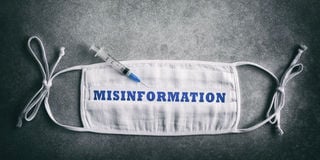In the war against fake news, social media giant Facebook finds itself on wrong side

Facebook has been accused of exposing its users to Covid-19 misinformation.
What you need to know:
- US activist group Avaaz published report recently
- Social media giant said to have used its algorithms to send misleading health information to 3.8 billion users
- Facebook says it applied warning labels to 98 million pieces of Covid-19 misinformation
- Ten sites that were found to be spreading health misinformation had almost four times as many views on Facebook as information from the WHO
That Facebook, according to a new report, has in the past year exposed billions of users to health misinformation, presents a snag in fighting fake news and helping populations make the right decisions.
The revelation by US activist group Avaaz, published recently, showed that the social media giant has used its algorithms to send misleading health information to 3.8 billion users in the past 12 months, peaking during the Covid-19 period.
There is no doubt that the infodemic has affected the more than seven million Kenyans who have a profile on the social platform, leading them to make dangerous decisions in the control of the coronavirus, with some even being gaslighted to believe the virus does not exist.
False claims about vaccines abound on the social network, and these could hamper efforts by global health research organisations to administer a Covid-19 jab should they find one.
Warning labels
Facebook, which has in the past five months held webinars on how it is helping online communities find credible health information, was forced to defend itself against the report, saying it shared Avaaz's goal of limiting misinformation.
"Thanks to our global network of fact-checkers, from April to June, we applied warning labels to 98 million pieces of Covid-19 misinformation and removed seven million pieces of content that could lead to imminent harm," it said in a statement.
Despite its initiatives of erasing fake content, Avaaz's findings suggested that only 16 per cent of the health disinformation it found on Facebook warned users against it.
Ten sites that were found to be spreading health misinformation had almost four times as many views on Facebook as information from the World Health Organization (WHO), the report revealed.
"There were 8.4 million views for an article claiming Bill Gates backed a polio vaccination that led to the paralysis of half a million children in India. A total of 4.5 million views for an article containing bogus cures for deadly diseases such as colloidal silver for Ebola. A total of 2.4 million views for an article claiming quarantine harmed public health," the report stated.
Fadi Quran, the director at Avaaz, decried how Facebook's behind-the-scenes algorithm had become a major threat to public health during the pandemic.
"Mark Zuckerberg promised to provide reliable information during the pandemic. But his algorithm is sabotaging those efforts by driving many of Facebook's 2.7 billion users to health-misinformation-spreading networks.
"This infodemic will make the pandemic worse unless Facebook detoxifies its algorithm and provides corrections to everyone exposed to these viral lies," he said.
800 people dead
Such misinformation is published as a news article, photo with caption, motion graphic or a video often shareable by users to groups, pages and friends.
Another report concluded that at least 800 people may have died around the world because of coronavirus-related misinformation in the first three months of this year, a finding that suggested more could have died in the proceeding months.
Further, about 5,800 people were reportedly admitted to hospital as a result of false information on social media, according to a study published in the American Journal of Tropical Medicine and Hygiene, with most people dying from drinking methanol or alcohol-based cleaning products after wrongly believing the products to be a cure for the virus.
In the context of the current coronavirus pandemic, it can greatly affect all aspects of life, specifically people's mental health.
WHO said while online search for Covid-19 information had soared to 70 per cent, an informational overload – some accurate and some not – had made it difficult for people to find trustworthy health sources and reliable guidance when they needed it.
During the onset of the pandemic, WHO said the infodemic surrounding Covid-19 was spreading just as quickly as the virus itself, with conspiracy theories, rumours and cultural stigma all contributing to deaths and injuries.
“We followed and examined Covid-19-related rumours, stigma and conspiracy theories circulating online, including fact-checking websites, Facebook, Twitter and online newspapers, and their impacts on public health,” the study said.
The survey analysed 2,311 reports related to Covid-19 infodemic in 25 languages from 87 countries. Of these, 2,049 (89 per cent) of the reports were classified as rumours, 182 (7.8 per cent) were conspiracy theories and 82 (3.5 per cent) were stigma.
Cow urine
The volume of rumours increased from February and continued until the end of the study period, peaking in the middle of March 2020, the researchers noted.
“For example, a popular myth that consumption of highly concentrated alcohol could disinfect the body and kill the virus was circulating in different parts of the world,” the authors wrote in their study.
Most of the rumours were related to Covid-19 illness, transmission and deaths, followed by interventions focusing on infection prevention and control measures.
Many of the victims had followed advice resembling credible medical information - such as eating large amounts of garlic or ingesting large quantities of vitamins - as a way of preventing infection, the study’s authors said. Others drank cow urine.
Kenya’s Health ministry warned the public against sharing unverifiable information online. It later had to clarify to the public that whereas a concoction of lemon, ginger and honey was good for the body, it was not an actual cure for Covid-19.
The remarks were made by Health Acting Director-General Patrick Amoth after a few prominent personalities who had Covid-19 promoted the concoction for their recovery.



